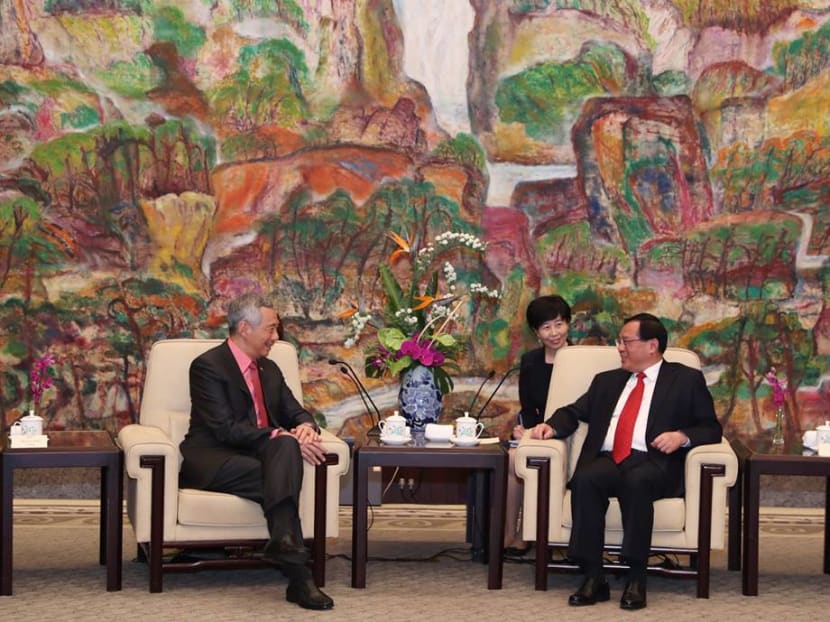Shanghai wants more co-operation with ‘role model’ S’pore, party chief says
SHANGHAI — Singapore has been a “role model” in Shanghai’s development over the past decades, Shanghai’s Communist Party chief Li Qiang said, highlighting that the Chinese financial hub is keen to strengthen the partnership between the two cities.
SHANGHAI — Singapore has been a “role model” in Shanghai’s development over the past decades, Shanghai’s Communist Party chief Li Qiang said, highlighting that the Chinese financial hub is keen to strengthen the partnership between the two cities.
This would be in key areas such as education, medicine, healthcare, research, and science and technology.
“We have certain advantages in these areas which complement the advantages of Singapore. For instance, there are about 64 universities and Shanghai enjoys a very sound reputation in the area of tertiary education in mainland China,” he added.
Meeting Prime Minister Lee Hsien Loong at the Xijiao State Guest Hotel in Shanghai on Wednesday (April 11), Mr Li said in his opening remarks that the defining feature of Shanghai is its openness, “just like Singapore, which has always been regarded by us as our role model”.
“We want to open our doors to the rest of the world.... Over the years, we have been learning from you and open ourselves to attract all kinds of factors of production, human resources and projects.”
Mr Li, 58, was named party secretary of the ruling Communist Party in Shanghai last October. He is one of the up-and-coming government officials in the Chinese leadership that Mr Lee met during his five-day official visit to China.
Speaking on the economy, Mr Li said that Singaporeans make up the biggest pool of foreign investors in Shanghai, and Singapore is seen as an important destination for outbound investment. He noted that while there was “sluggish” trade growth globally, trade between the two cities went beyond US$100 billion (S$130 billion) last year.
Both sides have also signed several agreements in recent years to enhance capital markets, boost ties between banks and corporations, as well as to build on partnerships in financial technology.
In deepening collaborations, apart from the key areas he mentioned, Mr Li also has a “strong personal interest” in the field of urban management.
The municipality operates the world’s largest mass-transit rail system on track, stretching 666km and serving some 10 million commuters daily. “So it is imperative for us to manage the city in a way that is smooth, orderly, without any major safety accidents... I (remember) visiting Singapore twice and I’m very impressed by the urban management of the city. So I really look forward to learning more from Singapore, drawing on your experience. I hope that we can carry out more cooperation in this regard.”
Shanghainese firms could also use Singapore as a platform to pave international expansions plans, along the Chinese-led Belt and Road initiative, Mr Li added.
He sees “huge potential” in getting people from both sides to work together, given the similarities in economic outlook and culture. “We always say that the amity between people holds the key to national friendships... The Chinese community accounts for about 70 per cent of the total population of Singapore. With the closeness of the culture, we can definitely have more exchanges in this area. We must appeal to the emotional affinity among the people,” he said.
In response, Mr Lee, who last visited Shanghai in 2010, noted in his opening comments that Shanghai is one of Singapore’s “most important focuses for economic cooperation in China”.
He agreed that both sides can enhance partnerships in the areas Mr Li highlighted, and invited the party chief to visit Singapore again.
Earlier on Wednesday, Mr Lee visited smart energy firm Envision, where he was briefed by chief executive Zhang Lei on how the company taps big data analytics to better manage energy production, storage, transmission and consumption.
Envision, which has offices worldwide, is building up a digital hub in Singapore, with plans to use it to experiment with new solutions and to enhance its reach in the international market.
Singapore real estate group Keppel Urban Solutions and solar energy firm Sunseap are among Envision’s partners. The Changi Airport Group is also exploring a pilot project with the firm on how its “predictive energy platform” could benefit the airport’s services.
The stopover at Envision was Mr Lee’s second site visit to a tech firm on this trip. On Monday, he visited China’s ride-hailing firm Didi Chuxing, which has been stepping up investments in artificial intelligence efforts.
Mr Lee wrote in a Facebook post after the visit that China is “leading the way” in innovation and adoption of smart city projects, and that he hopes some of these ideas can be applied in Singapore’s push towards being a smart nation. Coming up on Thursday, Mr Lee will speak and take part in a dialogue at the DBS Asian Insights Conference, held in conjunction with the bank’s 50th anniversary. He is also expected to give an interview to Singapore reporters before returning home.







